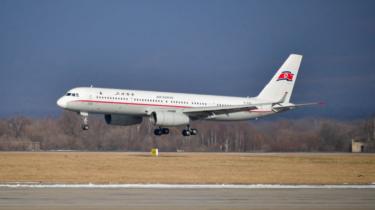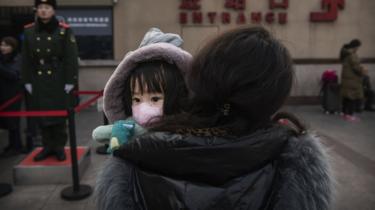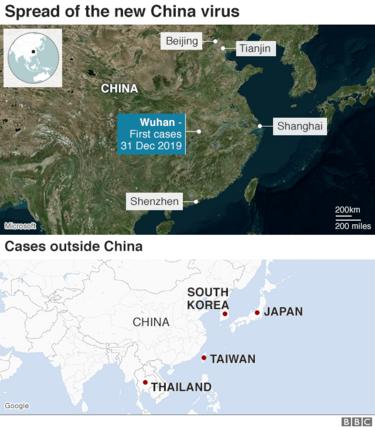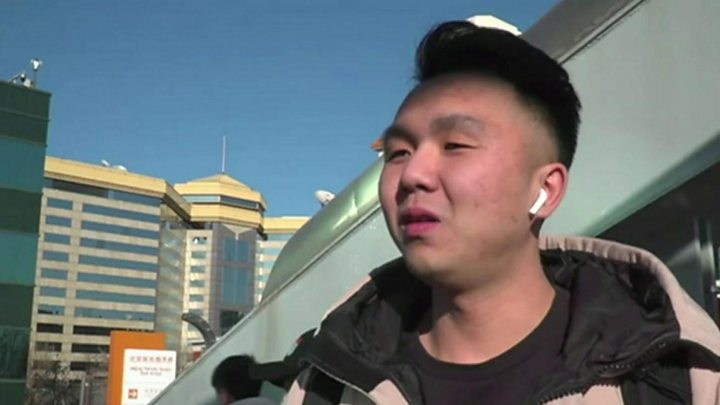Asia
 GETTY IMAGES
GETTY IMAGES
North Korea has temporarily closed its borders to tourists in response to an outbreak of a new coronavirus, a tour operator has said.
The virus, which originated in Wuhan in China, has infected almost 300 people.
Young Pioneer Tours said in a statement that the ban on tourists would be in place "temporarily" and was being implemented as a "precaution".
Earlier on Monday, Chinese officials confirmed for the first time that the virus could pass from person to person.
At the same time Chinese state media said six people had died from the infection, which causes a type of pneumonia.
- Your questions answered
- How worried should we be?
- Warning against cover-up as China virus cases jump
- China drug makers soar on virus contagion fears
In its statement, Young Pioneer Tours said: "As of Wednesday 22 January, 2020, the DPRK [North Korea] will temporarily close its borders to all foreign tourists as a precaution to the coronavirus.
"Further details are yet to be confirmed by our travel partners in North Korea and we will continue to make all future announcements on our website."
Another tour group that travels to North Korea, Koryo Tours, also tweeted about "possible limits to tourist entry".
 GETTY IMAGES
GETTY IMAGES
Some experts have previously warned that international sanctions on North Korea had hit the country's healthcare system, by restricting the delivery of aid and medical equipment.
Last November, US doctor Kee B Park wrote in USA Today: "I have seen how the North Korean doctors have adapted to scarcity. For example, they reuse intravenous catheters, scalpels, gauze and gloves by meticulously cleaning and re-sterilising them - until they become unusable."
Where has the virus spread?
A total of 291 cases have now been reported across major cities in China, including Beijing and Shanghai. However, most are in Wuhan, the central city of 11 million people at the heart of the outbreak.
The disease was first identified there late last year, and the outbreak is believed to be linked to a seafood market that also sells live animals.
A handful of cases have also been identified abroad: two in Thailand, one in Japan, one in South Korea and one in Taiwan. Those infected had recently returned from Wuhan.


Authorities in many places, including Australia, Singapore, Hong Kong, Taiwan and Japan have stepped up screening of air passengers from Wuhan. US authorities last week announced similar measures at airports in San Francisco, Los Angeles and New York.
In Australia, a man who had travelled to Wuhan has been placed in isolation and is undergoing tests. China is the largest source of tourists to Australia, with more than a million Chinese citizens visiting last year.
But the measures being put in place by North Korea are the strictest so far.
A report by the Centre for Global Infectious Disease Analysis at Imperial College, London, suggested there could be more than 1,700 infections. However, Gabriel Leung, the dean of medicine at the University of Hong Kong, put the figure closer to 1,300.
What else do we know about the virus?
The virus, known also as 2019-nCoV, is understood to be a new strain of coronavirus that has not previously been identified in humans.
Coronaviruses are a broad family of viruses, but only six (the new one would make it seven) are known to infect people.

The World Health Organization has advised people to avoid "unprotected" contact with live animals, thoroughly cook meat and eggs, and avoid close contact with anyone with cold or flu-like symptoms.
Signs of infection include respiratory symptoms, fever, cough, shortness of breath and breathing difficulties.
BBC news


.jpeg)

.jpeg)
0 Comments